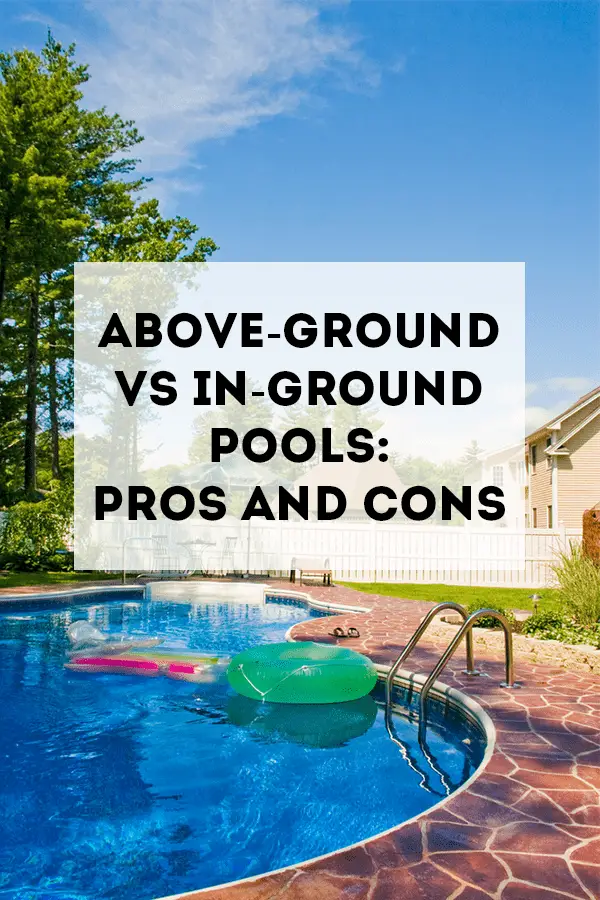
With warm weather approaching, there is nothing more enticing than the thought of getting to splash around in your very own pool. The ease of access of not having to get ready to go to a pool or a beach, and to just be able to pop into your own yard for some aquatic activity is certainly a dream of many people. If you are close to making that dream a reality, there is a big question that you are probably asking: above-ground or in-ground?
It’s a big decision, with a hefty financial commitment to going along with it. It would be terrible to have buyer’s remorse with something as expensive as a pool. There are plenty of differences between the two pool types. These include some of the obvious, including cost, ongoing maintenance, and pool size.
However, there are some not-so-obvious differences that it’s good to think about before you make a final decision. Here are some of the comparisons between above-ground and in-ground pools.
How Much Am I Going to Pay?
No pun intended, this is obviously the million dollar question of the whole pool setup. Unfortunately, the answer isn’t straightforward. The price for both pools can vary wildly. The only general rule that can be stated is that above-ground pools are generally significantly cheaper than in-ground pools. A lot of the final price factors will depend on the choices you make.
A simple, above-ground pool can start in just the hundreds of dollars and can
As for an in-ground pool, the cost is usually a lot heftier. While you may often see advertised a lower price to get you in the door, an in-ground pool generally starts at about $30,000 to put in. With the total customization that comes with an in-ground pool, this price tag can go way up, if you want to add bells and whistles.
How Long Until I Get In The Water?
If you are in a hurry, this is another question that comes to the top of people’s minds: once I commit to putting in a pool, how long do I have to wait until I can be in the water?
In-ground pools are obviously more significant projects, as they are meant to be a new permanent feature of your home. That means the project can be a long one, often taking between 6 and 10 weeks.
On the other hand, above-ground pools can generally be set up and installed within 1-3 days of getting it home, depending on the complexity of the kit.
One thing to keep in mind with both pools is that your terrain can play a significant factor in the installation process. Above-ground pools are meant to be installed on a level surface and in an area that is prepared to hold the weight of a pool. The soil and terrain type can both play an impact in the installation of in-ground pools and should be considered before committing to an installation. An expert may be required to give you an accurate assessment.
What Sizes and Shapes of Pools Can I Have?
There is a common belief that in-ground pools will be larger than above-ground pools. That isn’t the case. In a lot of cases, the above-ground pools can match the same surface area as some of the most common in-ground options.
Both pools can come in a wide variety of sizes, although you will always have more options with the customizable nature of the in-ground pools
Above-ground pools, being sold primarily in kits, come in two very standard shapes: circles and rectangles.
In-ground pools have plenty of options and the shape of the pool can only be constrained by the amount of space you have for the pool itself.
How Much Space Will My Pool Need?
This may sound like a trick question, directly correlating to the size of the pool itself. However, there are extra considerations to keep in mind. First off, in most cities, a permit will be required for any pool, either above or in-ground. Be sure to check your local requirements to ensure that your pool meets all of the local regulations, as well as your homeowner’s association, if applicable.
The other consideration is that an in-ground pool is thought of as a permanent piece of construction to your house. That means that there are other regulations, including setbacks from property lines. This can be as little as 5 feet, but it can certainly alter the dimensions that your in-ground pool will take. Check these requirements so that you know the real amount of space you can work with.
Because of their temporary nature, above-ground pools are often not treated the same way. The only exception is if you plan to build a deck or other features around the pool. In that case, the same requirements can apply.
How Deep Can My Pool Be?
This question can be answered very similarly to the shape of the pool. Above-ground pools can be a variety of depths since most of them include a ladder. However, the nature of the kit means that the pool will have a uniform depth. There is no mechanism for the pool to have variable depths. This also means that there are no available entries to most above-ground pools unless a separate deck structure is built.
Since an in-ground pool can serve as a blank canvas, depths can vary throughout, including having a deep end, for those who want to jump in or swim in deeper water. This also means that there can be steps into the pool, for easier exit and entry. The pool can be shaped to your desires.
How Long Will My Pool Last?
With the potential for a very significant investment, an important question to ask is how durable the pool will be. There are a few factors to consider.
For above-ground pools, there are a couple of different pieces that can breakdown. The first is the structure. This can last between 7-15 years, depending on maintenance and the sturdiness of the materials. Generally, more expensive kits will come with more durable structures to last longer. However, the liner of the pool will generally give out sooner, particularly with heavy use. Usually, this lifespan will be 5-9 years. The liners can undoubtedly be replaced with no particular difficulty.
In-ground pools are meant to last a lot longer, but the lifespan depends on the material used. For the most part, three primary materials are used for the construction. Vinyl pools have a long lifespan but, similar to above-ground pools, feature a lining that needs to be replaced, about every 5-9 years. Fiberglass is another option, and these pools generally last 20 years or longer. The most permanent and durable pool material is concrete, efficiently lasting, with care, up to 50 years and above. The only caveat is that concrete pools will need to be resurfaced.
How Do I Maintain My Pool?
Having a pool is not an idle job. Chemical balances constantly need to be maintained and handled, as well as regular cleaning. By and large, there is no real difference between in-ground and above-ground pools. This maintenance is crucial, not only for the enjoyment of the swimmers, but to ensure that the pool lasts to the longer end of its durability.
One thing to note is that some in-ground pools come with more automated systems to help maintain the pool. With this in mind, in-ground pools tend to be a little better maintained than above-ground pools.
The other bit of regular maintenance to be considered is, as mentioned above, is the resurfacing of concrete pools. This will need to be done every 10 or 15 years, for optimal lifespan.
Will A Pool Affect My Property Value?
First and foremost, it is worth saying that a pool should never be considered an investment, in terms of home value. While building a pool can have an impact on your property value, it will not pay for itself in home value. That being said, it is worth noting an impact, if you decide to sell your house.
Since they are considered temporary structures, above-ground pools will not affect your property value at all, unless there is an accompanying deck or patio structure.
The permanent structure of an in-ground pool is different, however. As it comes to an appraisal, no extra guaranteed considerations are included for having a pool. The difference can be seen when the time comes to put your house on the market. Some buyers actually see having a pool as a liability, because of the maintenance.
However, other buyers will see the pool as an opportunity, and a recent study showed that a pool can increase your value, in the right market. Either way, a pool will have some impact, and it is worth discussing with a real estate agent what to expect when a sale eventually occurs.
Do I Want My Pool Up Year Round?
The decision of whether you want your pool to be a permanent feature of your house or something only utilized for part of the year will probably depend on your locale. If you live in a warmer, year-round climate like Arizona or southern California, a pool will probably get year-round use. This can make sense to have the permanent structure of an in-ground pool.
For more temperate climates, pools will often not be used for the entire year. If that is the case, a pool that is left up can be winterized, ensure it stays in good shape for the return of warmer weather. If you are up to it, an above-ground pool can even be torn down during the colder months so that space can be used for other things.
How Costly Will Repairs Be?
No matter how sturdy or durable a pool you choose, repairs will need to happen, especially if the pool gets a lot of use.
Above-ground pools, by nature, are almost entirely external and open to access. When damage or breakage occurs, it can be easy to drain the pool and handle repairs. The downside is that, as mentioned, the above-ground options are less durable and that breakage is more likely to mean a replacement rather than a fix.
Since in-ground pools are permanent, the options for repair are a lot greater. These pools are meant to be around for decades. However, because everything is housed underground, repairs can be time-consuming and costly. There should always be money in the budget for the possibility of potential pool repair.
Can I Add Other Features to My Pool?
A pool can be so much more than just a pool, as nonsensical as that sounds at first. However, for the ability to add other features, one has to look to an in-ground pool. Above-ground pools can offer a few bells and whistles, including built-in lighting, heating systems, and automatic cleaners. However, after that, the options stop.
On the other hand, in-ground pools have a bevy of options. Spas or hot tubs can be attached, making the pool more usable in cooler temperatures. You can even include fire or water features to make the pool a real showstopper for your house and backyard. None of these cool features are options with an above-ground pool?
Can I Get A Pool That Is Exactly What I Want?
This is a little more nuanced. Above-ground pools have minimal customization, as they come in kits with predefined shapes and dimensions.
Some in-ground pools have a similar limitation. Most fiberglass in-ground pools come in predefined shapes, so they don’t feature full customization. If you want something particularly unique, you will need to consider a concrete pool. With this, you are truly dealing with a blank canvas and can set up the pool to your exact specifications.
Is One Pool Safer Than The Other?
There isn’t a crystal clear answer on this. A recent study showed that 58% of serious injuries occur in in-ground pools. However, it is worth noting that there is a far greater number of these pools, which obviously skews the data. Also, many cities require pools to be fenced in on your property, to alleviate some of the dangers.
Many families with young children like the fact that above-ground pools have a ladder that goes up to get in the pool. This means that most young children can’t get in the water unattended. On the flip side, a gated in-ground pool can accomplish the same security, so this one can indeed be a wash.
How Do I Winterize The Pools?
First off, not all pools need to be winterized. If you are in a situation where you will use a pool year-round, this can be avoided altogether. Winterizing a pool simply means preparing it for an extended period of disuse, which is important to the overall lifespan of a lot of the functionality of the pool.
For an above-ground pool, you have the option of simply taking the pool apart and storing it until warm weather returns, avoiding the winterizing process. However, this can be a lot of work and will depend on the ease of installation.
In-ground pools need to be winterized. This involves a thorough cleaning and a different balance of chemicals to ensure everything stays clean and functional during the winter months. However, a proper winterizing ensures that.
What Is More Energy Efficient?
One thing worth remembering is that a pool can have some ramifications for your utility usage. Keeping a pool filtered and heated adds to your energy bill. Thankfully, both pools are about the same in terms of efficiency, when you account for space.
However, there are plenty of additional things you can do to increase energy efficiency, such as using a thermal cover and investing in specific pool appliances, like heaters, that are made to be energy efficient. Simple fixes like this can effective in keeping the monthly pool cost at a minimum.
The decision to invest in a pool is a big one, and the options are entirely different, fitting a lot of circumstances. However, the information here should empower you to make the best decision for you and your family.
There is no hard and fast right or wrong answer. When deciding between an above-ground or in-ground pool, it all comes down to what suits you best. While a more significant investment, an in-ground pool can be a permanent solution that you can truly customize and use year-round.
An above-ground pool provides a smaller investment and a more temporary structure, which can be beneficial. Either way, you can be splashing in the sun in no time.


